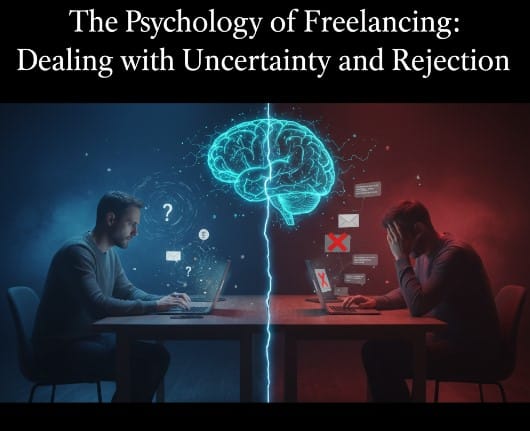The Hidden Side of Freelancing
When people think of freelancing, they picture freedom: working from a beach café, setting your own hours, and being your own boss.
But the reality? Freelancing often comes with uncertainty, rejection, and emotional ups and downs.
One week you’re fully booked with clients, the next week you’re refreshing your inbox, wondering where the next project will come from. And rejection? It’s part of the game—but it still stings.
Why Uncertainty Feels So Heavy
Humans crave stability. Freelancing, by nature, challenges that:
- Income varies month to month.
- Clients may disappear without warning.
- Projects are temporary, not permanent.
This uncertainty can lead to stress, anxiety, and even questioning your career choices.
👉 The truth: uncertainty isn’t a sign of failure—it’s a normal part of the freelancing journey.
The Psychology of Rejection
Rejection is one of the hardest parts of freelancing. Sending a proposal and getting no response can feel personal. But here’s what to remember:
- It’s rarely about you. Clients may have budget limits, timing issues, or other candidates.
- Rejection is feedback. Each “no” teaches you how to refine your pitch.
- It builds resilience. The more you face rejection, the less power it holds over you.
Practical Ways to Cope
1. Reframe Uncertainty
Instead of seeing it as instability, see it as opportunity.
- Uncertainty = freedom to pivot, try new niches, or adjust your offers.
- Create safety nets (emergency fund, multiple income streams).
2. Normalize Rejection
Keep a simple rule: “Every no brings me closer to a yes.”
- Track pitches → responses → wins.
- Celebrate effort, not just results.
3. Build Routines for Stability
Freelancing may be flexible, but routines create balance.
- Fixed start/end work hours.
- Daily marketing habit (send 2 pitches/day).
- Weekly review of wins + lessons.
4. Protect Your Mental Health
- Practice mindfulness or journaling.
- Exercise to release stress.
- Connect with other freelancers for support.
A Freelancer’s Story
When Amina started freelancing as a writer, she faced rejection after rejection. Dozens of unanswered proposals nearly made her quit.
But instead of giving up, she:
- Studied the pitches that worked.
- Focused on small wins.
- Built a simple routine to send 5 proposals weekly.
Six months later, she landed consistent clients and doubled her income.
👉 Lesson: resilience—not perfection—is what turns freelancers into professionals.
Future-Proofing Your Mindset in 2025
As AI reshapes the freelance landscape, adaptability will matter more than ever. The freelancers who thrive will be those who:
- Embrace uncertainty instead of fearing it.
- Treat rejection as part of growth.
- Balance ambition with mental well-being.
Conclusion: Mastering the Emotional Game
Freelancing isn’t just about skills—it’s about mindset. If you can navigate uncertainty and handle rejection with resilience, you’ll unlock the freedom and opportunity freelancing truly offers.
🔑 Question for You: How do you personally deal with rejection—does it fuel you, or slow you down?
Light CTA:
If this article spoke to you, share it with another freelancer. A little encouragement can go a long way in this journey.


